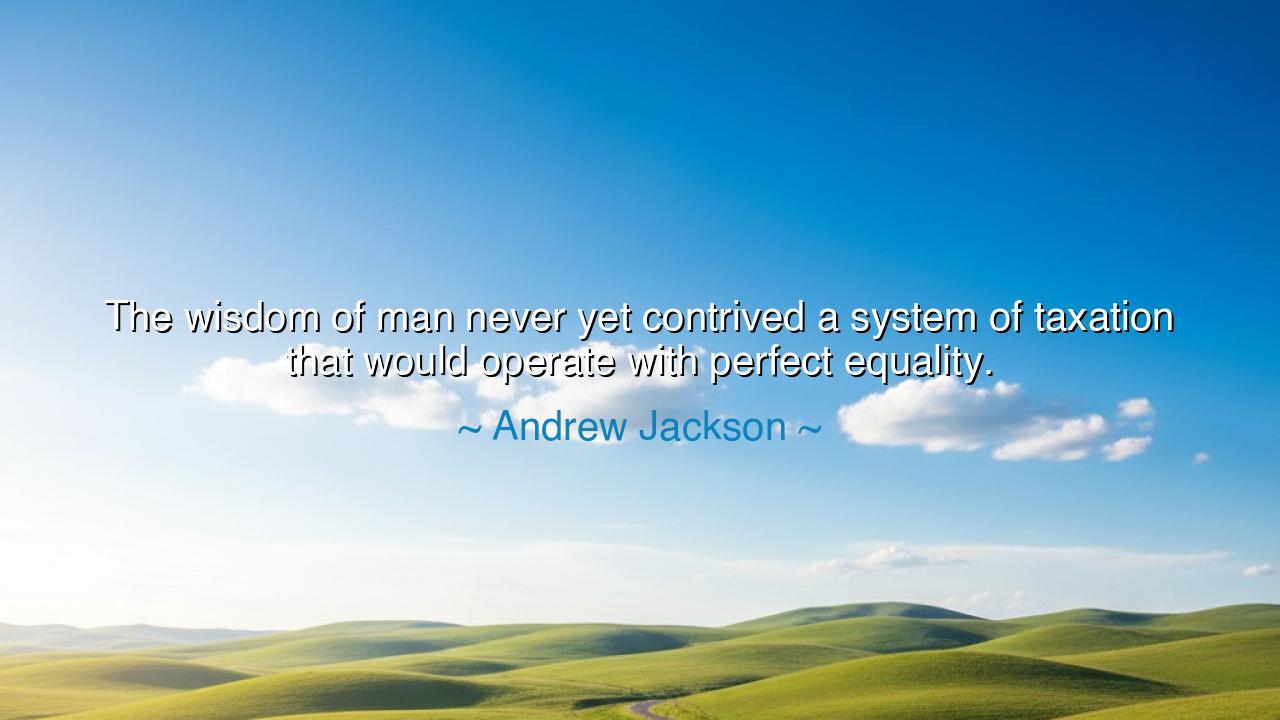
The wisdom of man never yet contrived a system of taxation that
The wisdom of man never yet contrived a system of taxation that would operate with perfect equality.






The words of Andrew Jackson—“The wisdom of man never yet contrived a system of taxation that would operate with perfect equality.”—ring with the realism of a soldier and the humility of a statesman. Beneath their calm simplicity lies a truth that echoes through every age: that the affairs of humankind, however noble in design, can never escape imperfection. Jackson, a man forged in the crucible of both war and governance, spoke not from cynicism but from experience. He had seen how every attempt to balance the burdens of wealth and poverty stumbled upon the same eternal problem—the flawed nature of man’s wisdom, and the limits of human justice.
The origin of this quote lies in the early years of the American republic, when the nation wrestled with the question of how to tax fairly and govern justly. As the seventh President of the United States, Jackson had come from humble beginnings. He rose from poverty to power, a self-made man who understood both the struggles of the poor and the privileges of the rich. In his time, the young nation debated how to sustain its government without crushing its people—how to make taxation serve the common good, not the greed of the few. In speaking these words, Jackson acknowledged an uncomfortable truth: that while laws can aim for fairness, they can never achieve perfect equality, for men themselves are imperfect creatures.
Jackson’s insight reaches far beyond economics—it touches the core of human society. Every system built by human hands bears the mark of its maker: the trace of pride, ignorance, or bias. Thus, taxation, which seeks to divide the burdens of a nation according to justice, inevitably divides also according to perspective. What one man calls fair, another calls oppressive; what one sees as duty, another sees as theft. The farmer feels the weight of the land tax, the merchant the sting of the tariff, and both claim inequality. Jackson saw that true equality in taxation—the perfect balance between contribution and benefit—was as unattainable as perfection itself, and that humility before this truth was the beginning of wisdom in governance.
History bears witness to his wisdom. Consider the reign of Emperor Augustus in ancient Rome, who sought to create a just and lasting system of taxation. His reform replaced the chaos of tribute and corruption with a census-based tax, one meant to measure wealth and distribute burden fairly. Yet even this great reform faltered over time. The rich found ways to hide their wealth; the poor bore the load of those more cunning. The empire’s coffers swelled, but its people grew weary, and rebellion smoldered in the provinces. Thus, even the might of Rome, guided by one of history’s most capable rulers, could not create a system free from imbalance. Human ambition and imperfection forever tilted the scales.
Yet, Jackson’s words are not a counsel of despair—they are a call to prudence and humility. He reminds us that while perfection may be beyond reach, striving for fairness is not in vain. The duty of rulers is not to create flawless systems, but to temper power with conscience, and to ensure that the burdens of governance fall with as much justice as mortal wisdom can allow. The wise lawgiver does not claim to have found equality; he seeks instead to prevent its opposite—injustice and privilege—from devouring the spirit of the people. It is this balance, fragile but vital, that sustains the trust between government and governed.
There is also in Jackson’s words a quiet warning to every generation. When men grow arrogant in their laws, believing they have achieved perfect justice, tyranny begins to creep beneath the surface. For to believe in perfect equality is to forget human limitation, and to forget limitation is to court corruption. The just ruler must walk in humility before imperfection, ever revising, ever reforming, knowing that fairness must be renewed with each age. In this humility lies strength, for it keeps a nation vigilant, self-aware, and alive to its own faults.
So, my child, remember this teaching: no system built by man will ever be perfect, but every system must strive toward justice. The same is true not only in government, but in every walk of life. In your dealings with others, seek not perfect fairness, for you will never find it; instead, seek understanding, mercy, and balance. When you give, give with awareness of what others bear; when you lead, lead with the remembrance that no one escapes error. For the measure of wisdom is not the absence of imperfection, but the willingness to correct it.
Thus, in the spirit of Andrew Jackson’s words, let us accept that equality is not a destination, but a pursuit. The systems of man will falter, but the striving for fairness is what keeps the soul of liberty alive. For as long as people remember that perfection is beyond them, yet justice still demands their labor, there will be hope for every nation—and dignity in every heart that seeks the good of all.






AAdministratorAdministrator
Welcome, honored guests. Please leave a comment, we will respond soon